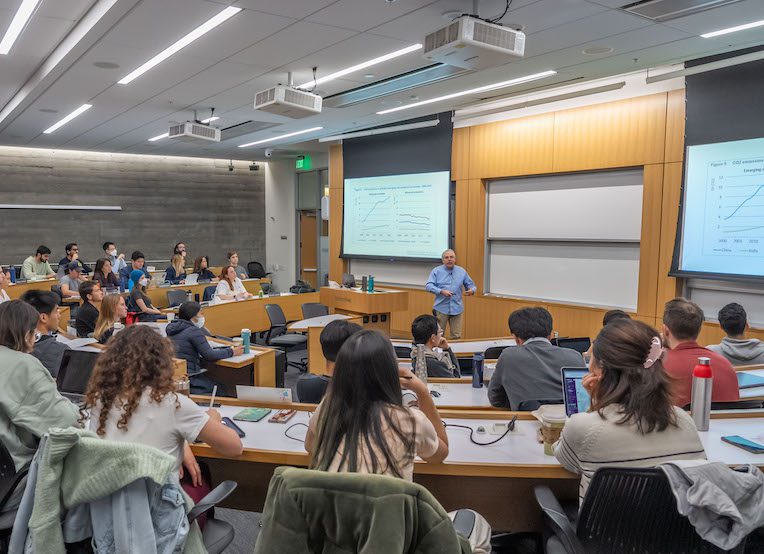
The Haas School of Business and the Rausser College of Natural Resources at UC Berkeley have launched a concurrent MBA/Master of Climate Solutions (MCS) degree program to prepare the next generation of sustainability and climate leaders.
The new program, enrolling for fall 2024, will allow full-time MBA students to earn both a Master of Business Administration and a Master of Climate Solutions degree in five semesters, or two-and-a-half years. The application deadlines for the first MBA/MCS cohorts are January 4, 2024, and March 28, 2024.
The MBA/MCS degree is designed for early-career professionals who plan to take their careers to a higher level of business leadership, grounded in understanding of sustainability and climate change challenges and opportunities.
Berkeley Haas Dean Ann Harrison said the new program will draw from the strength of both schools, allowing students to learn from some of the world’s top minds in climate change, sustainability, and business.
“Future business leaders will require a depth of training in both business and climate change to work across disciplines and execute competitive strategies,” Harrison said. “This new program will provide a breadth of skill sets, equipping our grads to lead in building a sustainable, low-carbon future.”
“Future business leaders will require a depth of training in both business and climate change to work across disciplines and execute competitive strategies.” — Haas Dean Ann Harrison.
The program aims to develop critical skills and knowledge in climate data science, carbon accounting, and lifecycle analysis, as well as technological and nature-based solutions.
Students in the MBA/MCS cohort will spend the first year completing MBA core coursework at Haas before moving to classes at Rausser. The rigorous MBA curriculum includes courses in leadership, marketing, management, finance, data analysis, ethics, and macroeconomics, along with sustainability courses.
Doubling down on sustainability
Under Harrison’s leadership, Haas has doubled down on sustainability through the creation of the Office of Sustainability and Climate Change and by revamping all of the MBA core courses to incorporate thinking about climate change and other sustainability challenges.
The new MBA/MCS degree program follows Rausser’s launch of its new Master of Climate Solutions degree. MCS courses will translate the fundamental science and groundbreaking discoveries of UC Berkeley experts, enabling professionals to learn how to evaluate technologies, develop just climate strategies, and remove barriers to implementing practical climate solutions. The MCS core curriculum includes teaching in the climate and environmental sciences, climate economics and policies, technological, business and nature-based solutions, training in analytical and quantitative skills, and applied exercises and engagements that emphasize adaptive thinking and problem-solving.
“The Master of Climate Solutions represents a critical step forward in expanding the interdisciplinary and highly interconnected community of practitioners needed to solve the climate crisis,” said David Ackerly, dean of UC Berkeley’s Rausser College of Natural Resources. “Students in the concurrent program will be able to leverage the critical climate knowledge and tools taught in the MCS, as well as the leadership and business skills that are core to Haas.”
“Haas and Rausser both have such impressive track records in climate research,” added Michele de Nevers, managing director of the Office of Sustainability and Climate Change at Haas. “This program combines our offerings at the master’s level, with a keen focus on professional students, who are clearly positioned to make an immediate impact, and who serve a critical role as translators of academic insights and enacting these insights in the world.”
Addressing the Climate Challenge
All MBA/MCS students will participate in a semester-long capstone program that gives students the opportunity to partner with organizations operating across the business, government, and non-profit sectors. A unique leadership course on organizational, political, and societal change for climate solutions will prepare students to be change agents and leaders in businesses, nonprofits, and government agencies.
“New research on climate solutions is still critical, but we already know many of the things we need to do to address the climate challenge,” said James Sallee, a professor in the Department of Agricultural and Resource Economics and faculty director of the MCS program. “What we really need are people spread throughout society and the economy who are in a position to take action on climate, and who are equipped with the tools to make the right choices. Educating those students is the vision of the MCS program.”
Summer internships are also crucial to the MBA/MCS program. Students will complete two summer internships, which will allow for deep immersion in different disciplines and more time to build relationships.
Haas now has four dual degree programs, including the MBA/MPH (public health), the MBA/MEng (engineering), and the MBA/JD (law).